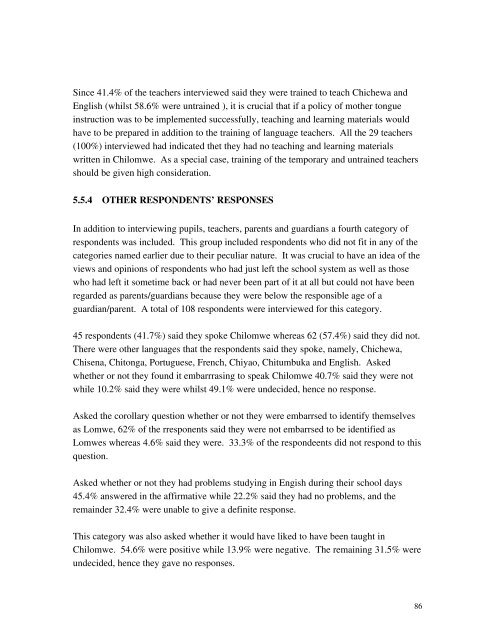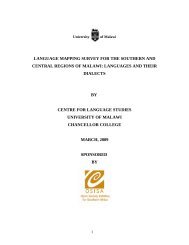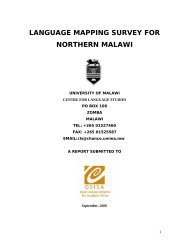SOCIOLOLINGUISTIC SURVEYS - Centre for Language Studies
SOCIOLOLINGUISTIC SURVEYS - Centre for Language Studies
SOCIOLOLINGUISTIC SURVEYS - Centre for Language Studies
Create successful ePaper yourself
Turn your PDF publications into a flip-book with our unique Google optimized e-Paper software.
Since 41.4% of the teachers interviewed said they were trained to teach Chichewa and<br />
English (whilst 58.6% were untrained ), it is crucial that if a policy of mother tongue<br />
instruction was to be implemented successfully, teaching and learning materials would<br />
have to be prepared in addition to the training of language teachers. All the 29 teachers<br />
(100%) interviewed had indicated thet they had no teaching and learning materials<br />
written in Chilomwe. As a special case, training of the temporary and untrained teachers<br />
should be given high consideration.<br />
5.5.4 OTHER RESPONDENTS’ RESPONSES<br />
In addition to interviewing pupils, teachers, parents and guardians a fourth category of<br />
respondents was included. This group included respondents who did not fit in any of the<br />
categories named earlier due to their peculiar nature. It was crucial to have an idea of the<br />
views and opinions of respondents who had just left the school system as well as those<br />
who had left it sometime back or had never been part of it at all but could not have been<br />
regarded as parents/guardians because they were below the responsible age of a<br />
guardian/parent. A total of 108 respondents were interviewed <strong>for</strong> this category.<br />
45 respondents (41.7%) said they spoke Chilomwe whereas 62 (57.4%) said they did not.<br />
There were other languages that the respondents said they spoke, namely, Chichewa,<br />
Chisena, Chitonga, Portuguese, French, Chiyao, Chitumbuka and English. Asked<br />
whether or not they found it embarrrasing to speak Chilomwe 40.7% said they were not<br />
while 10.2% said they were whilst 49.1% were undecided, hence no response.<br />
Asked the corollary question whether or not they were embarrsed to identify themselves<br />
as Lomwe, 62% of the rresponents said they were not embarrsed to be identified as<br />
Lomwes whereas 4.6% said they were. 33.3% of the respondeents did not respond to this<br />
question.<br />
Asked whether or not they had problems studying in Engish during their school days<br />
45.4% answered in the affirmative while 22.2% said they had no problems, and the<br />
remainder 32.4% were unable to give a definite response.<br />
This category was also asked whether it would have liked to have been taught in<br />
Chilomwe. 54.6% were positive while 13.9% were negative. The remaining 31.5% were<br />
undecided, hence they gave no responses.<br />
86





